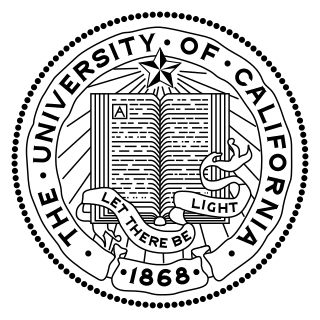
The University of California (UC) is a public land-grant research university system in the U.S. state of California. Headquartered in Oakland, the system is composed of its ten campuses at Berkeley, Davis, Irvine, Los Angeles, Merced, Riverside, San Diego, San Francisco, Santa Barbara, and Santa Cruz, along with numerous research centers and academic centers abroad. The system is the state's land-grant university.
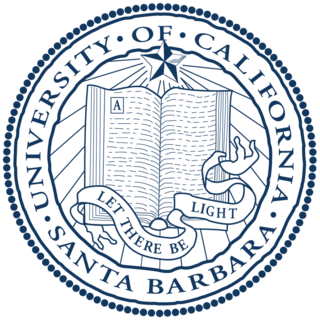
The University of California, Santa Barbara is a public land-grant research university in Santa Barbara County, California, United States. Tracing its roots back to 1891 as an independent teachers' college, UCSB joined the University of California system in 1944. It is the third-oldest undergraduate campus in the system, after UC Berkeley and UCLA.
"Public Ivy" is an informal term that refers to public colleges and universities in the United States that are perceived to provide a collegiate experience on the level of Ivy League universities. There is no trademark for the term, and the list of schools associated with the classification has changed over time.
Candidate of Philosophy can refer to the US degree or status of Candidate in Philosophy granted to Ph.D. students who have been accepted as candidates for that degree, or to degrees or former degrees at bachelor's or master's level from some Scandinavian countries.

The California Collegiate Athletic Association (CCAA) is a college athletic conference affiliated with the National Collegiate Athletic Association (NCAA) at the Division II level. All of its current members are public universities, and upon UC San Diego's departure on July 1, 2020, all are members of the California State University system.

The University of California Student Association (UCSA) is an active 501(c)(3) unincorporated association, purposed as a student association of all University of California (UC) students. Its charter states that it "shall exist to: serve the interests of the current and future students of the University of California and promotes [sic] cooperation between various student governments of the University and student organizations concerned with higher education." The Association is not a public agency, but its leadership is composed of representatives of UC student governments, which are "official units of the University" system. UCSA participates in various aspects of the UC system's governance, notably including the selection of the student representative on the UC Board of Regents.
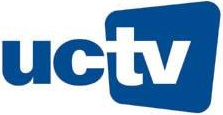
University of California Television is a 24-hour television channel presenting educational and enrichment programming from the campuses, national laboratories, and affiliated institutions of the University of California system. UCTV's non-commercial programming delivers science, health and medicine, public affairs, humanities, and the arts to a general audience, as well as specialized programming for health care professionals and teachers. Programming includes documentaries, lectures, debates, interviews, performances and more.

Daniel Gaskill Aldrich, Jr. was the founding chancellor at the University of California, Irvine from 1962 to 1984. He also served as acting chancellor at the University of California, Santa Barbara from 1986 to 1987 and acting chancellor at the University of California, Riverside from 1984 to 1985.
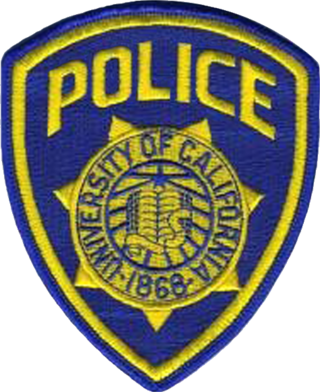
The police departments of the University of California system are charged with providing law enforcement to each of the system's campuses.

The UC Santa Barbara Gauchos are the intercollegiate athletic teams representing the University of California, Santa Barbara. Referred to in athletic competition as UC Santa Barbara or UCSB, the Gauchos participate in 19 NCAA Division I intercollegiate sports with the majority competing in the Big West Conference. UCSB currently fields varsity teams in 10 men's and 9 women's sports.

The Western Collegiate Lacrosse League (WCLL) is a conference that participates in the Men's Collegiate Lacrosse Association (MCLA). The WCLL operates in California, Nevada, and Oregon and is split into two divisions, Division I and Division II. The conference is governed by an executive board and the teams that win the conference's divisional playoffs receive automatic bids to the MCLA National Tournament.
The WCCC or Western Collegiate Cycling Conference is a collegiate cycling conference based in the western United States. The conference is composed of 29 schools from California, Northern Nevada, and Hawaii. Schools include current Road National Champions UC Davis as well as former champions Stanford and UC Berkeley. The schools in the conference compete in road cycling races in the spring and mountain bike racing in the fall. The conference is governed by the National Collegiate Cycling Association, a division of USA Cycling. The conference is split into two divisions.
The Pacific Coast Collegiate Sailing Conference (PCCSC) is one of the seven conferences within the Inter-Collegiate Sailing Association, the governing body for collegiate competition in the sport of sailing.
A Transfer Admission Guarantee is a program that offers students from a community college guaranteed admissions to several colleges and universities. The writing of a TAG contract enables qualified students to be guaranteed admissions one year prior to transfer. Students must meet certain requirements to be eligible for a TAG.

Lise Getoor is an American computer scientist who is a distinguished professor and Baskin Endowed chair in the Computer Science and Engineering department, at the University of California, Santa Cruz, and an adjunct professor in the Computer Science Department at the University of Maryland, College Park. Her primary research interests are in machine learning and reasoning with uncertainty, applied to graphs and structured data. She also works in data integration, social network analysis and visual analytics. She has edited a book on Statistical relational learning that is a main reference in this domain. She has published many highly cited papers in academic journals and conference proceedings. She has also served as action editor for the Machine Learning Journal, JAIR associate editor, and TKDD associate editor.
The Digital Cultures Lab (DCL) is a University of California research group based in Los Angeles, California. The lab is directed by Dr. Ramesh Srinivasan, an associate professor of Information Studies in the Graduate School of Education & Information Studies at the University of California, Los Angeles. The group was founded in the fall of 2013, and has steadily grown to include members of nearly every UC campus.
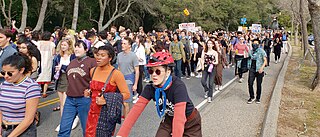
The 2020 Santa Cruz graduate students' strike was a wildcat strike launched against the University of California, Santa Cruz (UCSC).









